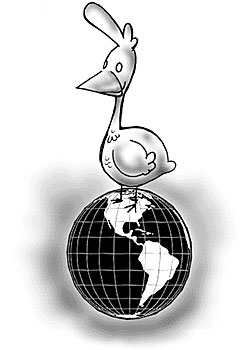
Illustration by Cody Angell
|
By Phil Leckman
Arizona Daily Wildcat
Monday February 24, 2003
To the casual observer, the restaurant at Broadway a little past Tucson Avenue hardly looks like a place of global significance. Even the brightly lit happy chicken sign erected by the place's new residents is easily missed during a hectic Tucson rush hour. But appearances can be deceiving. In its own small way, Pollo Feliz ÷that's "happy chicken" in Spanish ÷ sits at the crest of a building wave that may one day transform cultural and economic life in the United States and beyond.
Inside the restaurant, a gaggle of bored teenagers in matching uniforms stands behind a wide counter, no different from the thousands of teenagers staffing fast food chains across the country. Behind them, a pre-printed menu illustrates the restaurant's offerings with photos that are appealing enough, if a trifle plastic-looking in that familiar fast food way.
Besides its delicious grilled chicken, not much distinguishes this from other fast food chains. Only the paper mat on the plastic tray holding your food hints at the fundamental difference that sets Pollo Feliz apart ÷ and potentially makes it so important.
The mat displays a map of the chain's locations, an empire of "Pollos Felices" stretching across Mexico. It also reveals, however, that the Tucson location is one of the chain's first forays north of the border. And that's the important part: While it follows the tried-and-true tenets of American fast food marketing in every way, Pollo Feliz is a Mexican company, not an American one. Its corporate offices are located in the Mexican state of Sinaloa, not New York. This distinction signals important changes brewing for the economies of the United States and the world.
For many people, the model of global capitalism is a fairly straightforward one. Capital and investment from the United States, Western Europe, and perhaps a handful of wealthy Asian countries flow out to the "developing" economies of Latin America, China, Southeast Asia and the rest of the world. Raw materials and goods produced by cheap third-world labor flow back for sale in the West.
Finally, substantial chunks of mass-produced goods find their way back to the developing world, repackaged as desirable American exports and accompanied by the real engine of American hegemony: the blizzard of movies, music and television that sells the "American dream" to people whose place in that dream extends no further than a 12-hour shift at the Nike factory.
That's how most in the United States imagine the global economy, and that's how it's been portrayed through the fierce, sometimes violent struggles over globalization of the last few years, regardless of which side of the argument one takes to be true. And there's no denying the truth of this model in many respects: The United States holds unprecedented power over the world economy.
But it's more complicated than that. While the networks of commerce and culture extending from Hollywood and Wall Street to the rest of the world have typically been envisioned as one-way streets, an increasing body of evidence suggests this is not always the case. The economic thoroughfares by which American money and ideas have so transformed the rest of the world can, theoretically at least, operate in reverse. And as businesses like Pollo Feliz demonstrate, they increasingly do.
While foreign ownership of American businesses is nothing new ÷ German Bertelsmann and Japanese Sony together dominate the US recording industry ÷ a new wave of
global capitalism is swelling in places far removed from the financial capitals of the West. This wave is already changing the world. Its influence will only grow in the years to come.
Pollo Feliz is one example, but there are many others. Though American television still reaches most of the world, for instance, products from developing nations increasingly compete with U.S. imports, both locally and internationally. The world's most famous television actors are Mexican soap opera stars like Thalia, not the casts of "Friends" or "Seinfeld."
While these changes may alarm America-firsters, they are in fact quite encouraging. A real global economy with input from all countries, not just the U.S. and Europe, will ultimately be a fairer, healthier one. But global savvy will be required for Americans who wish to compete in this emerging international economy ÷ the ignorance of the rest of world so many of us wear as a badge of honor will increasingly blind Americans to the realities of an ever-shrinking world.

